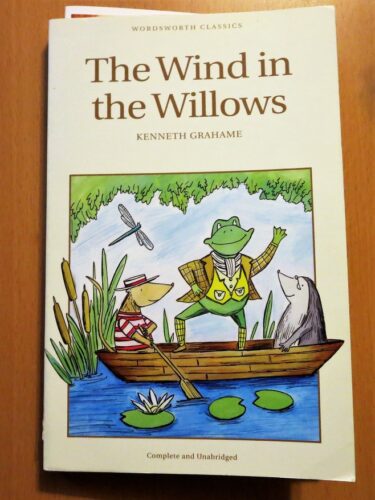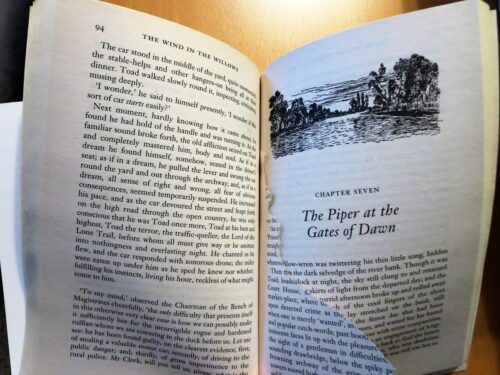Continuing my quest to read all of the Top 100 Children’s Books, I read The Wind in the Willows by Kenneth Grahame. In short, the story is about three anthropomorphic animals (Mole, Ratty, and Badger) who become friends and help another animal (Mr. Toad) when he gets himself into trouble. This story was, I was once told, my father’s favorite book as a child, and he used to own (and perhaps still does) multiple copies of it. I happen to own an old copy of it myself, passed down to me from my aunt when I was a child. Strangely, though, I had never read the book, or at least not that I recalled. So it was certainly high time for me to do so. I bought a used soft-cover printing for convenience of reading.

The book looked as though it had not been read, which struck me as sad. I wasn’t being judgmental (how hypocritical would that be!), just wistful. I’ve tried to pass down my love for certain books to my children, and I’ve often failed. In any event, the book was in near-perfect condition, so it was quite a shock when I got to page 94.

The timing of the missing page couldn’t have been worse worse. Toad had gotten himself into a pickle, and how could the reader know what happened if they couldn’t read the next page? I had that other copy to fall back on, so I simply went to my bookshelf, pulled down the book, and found the relevant section. No cliffhanger for me (whew!). But nobody wants a book with a missing page, so whoever ripped that page out, whether purposefully or by accident, had dealt the book a fatal blow. That’s too bad.
There was a small bright side, though. One of my failings as a reader is that I often overlook chapter headings. The empty space where the page ought to have been caused me to focus on the heading of the next chapter: Piper at the Gates of Dawn. It’s a great title, isn’t it? And I knew I’d heard it before, so I Googled it. What I found is that it’s also the name of Pink Floyd’s first studio album (no wonder it sounded familiar!). As the Wikipedia article states, “The album title was derived from chapter seven of Kenneth Grahame’s 1908 children’s novel The Wind in the Willows, a favourite of [Syd] Barrett’s.”
I listened to the album. In it I could hear echoes of other bands of the day (The Beatles, The Moody Blues, etc.) as well as hints of what the band would someday become. Through the magic of YouTube, whose mysterious algorithms are notorious for sending the unwary down infinite rabbit holes, I spent an enjoyable part of a day wandering through a labyrinth of Pink Floyd songs from several different albums. As for that fabled chapter of the book, it was also very enjoyable, definitely worth reading if you haven’t already.
After finishing the book, I gave it an A- grade. It’s been months since, and I forget exactly what made me add the minus. It was most likely the feeling, which has persisted even as details of the story have faded, that there was a distinct and slightly unwelcoming “British bachelor” vibe to it. Some people have called the novel a “gay manifesto.” I wouldn’t go that far, but I do think you could read into the text that the author preferred the company of other men exclusively.
Anyway, the feeling of invading a men’s-only space didn’t ruin the story for me, and I would still recommend the book. What it comes down to is that, like most books that are marketed to children, it’s best to read it when you’re a child, while you’re still young enough to take it at face value. As a child, you’ll see nothing but some amiable animals being great friends and going on adventures together. If you come to it late, as I did, then you’ll just have to accept that your reading experience may be a little different.
